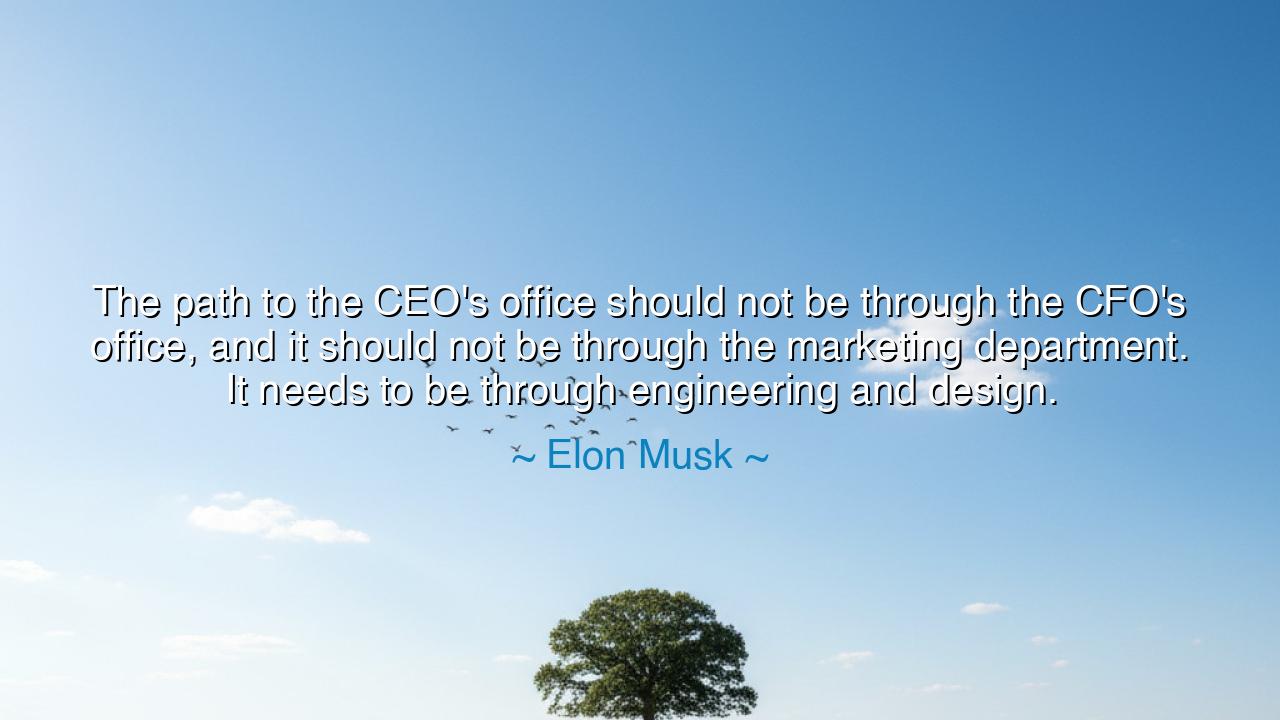
The path to the CEO's office should not be through the CFO's
The path to the CEO's office should not be through the CFO's office, and it should not be through the marketing department. It needs to be through engineering and design.






“The path to the CEO’s office should not be through the CFO’s office, and it should not be through the marketing department. It needs to be through engineering and design.” — Elon Musk
Listen well, O seekers of progress, to the words of Elon Musk, the modern Prometheus who has dared to bring fire from the heavens and awaken mankind’s sleeping ambition. In this saying, he speaks not of titles or positions, but of vision — of the soul and discipline that must lead the engines of creation. When he declares that the path to the CEO’s office should pass not through the CFO’s office nor through marketing, but through engineering and design, he is reminding us that the heart of true leadership is not in managing wealth or shaping illusion, but in building reality. For those who make the world’s future must first understand how the world is made.
The origin of these words springs from Musk’s own life, carved from the steel and sweat of invention. As founder and leader of Tesla, SpaceX, and other ventures that have redefined the boundaries of technology, he has stood among the engineers, not above them. He has looked upon circuits, rocket engines, and software not as abstractions, but as living puzzles to be solved. Through countless nights of labor, when balance sheets wavered and investors fled, it was not finance or advertising that saved his companies — it was engineering and design, the relentless pursuit of function and form perfected. Thus, this quote is not a critique of other professions, but a creed: that the one who leads should first know how to create.
In every age, this truth has revealed itself. Consider the story of Thomas Edison, who did not lead laboratories through wealth, but through invention. He failed a thousand times before the lightbulb was born, yet each failure became a step toward mastery. His understanding of materials, of heat, of resistance, made him not merely a dreamer, but a doer — and in his doing, he built an empire of innovation. Contrast this with those who lead by numbers alone: their fortunes rise and fall with the markets, but the creations of builders endure beyond the age that birthed them. Thus Musk’s words echo a wisdom older than himself — that the leaders of tomorrow must be makers, not merely managers.
When Musk warns against the rule of the CFO and the marketing department, he speaks of imbalance. For when the guardians of money and image hold the throne, a company begins to wither in spirit. Profit becomes the master, and purpose the servant. Innovation gives way to caution; creativity bows before quarterly results. The vision fades, replaced by the shadow of maintenance. But when the engineer and the designer lead, the organization breathes again. Their focus is not on illusion, but on improvement; not on appearances, but on truth. They see not only what is, but what could be — and from this, all progress is born.
This idea is not confined to industry alone. It is a principle of life itself. Every human endeavor — from art to governance — must be guided by those who understand the craft, not merely the cost. When architects cease to build and instead count stones, their cities crumble. When leaders lose sight of the work that sustains their people, their empires fall. To lead is to serve creation, to bear responsibility not only for outcomes but for the process that yields them. Musk’s words are thus a summons to humility: let those who aspire to lead first learn to create, for only then can they know what leadership demands.
And yet, his statement also burns with hope. For it tells us that the future belongs to the builders — to those who dream with their hands as well as their minds. The engineer, the coder, the designer, the craftsman — these are the new philosophers of the age. They do not merely imagine; they manifest. They transform the abstract into the tangible, the possible into the real. In their eyes burns the same flame that once guided the sailors of discovery and the artists of the Renaissance: the belief that human ingenuity can bridge earth and heaven.
So, O children of invention, take this lesson into your heart: do not seek to lead by command — lead by creation. Learn your craft deeply, for the authority of understanding is greater than the power of words. Let your leadership rise from your ability to build, not merely to direct. And when you climb to the summit of responsibility, remember this truth: the strength of any kingdom, company, or cause lies not in its wealth or reputation, but in the design of its ideas and the engineering of its purpose. Walk, then, the path of the maker — for it is through engineering and design that humanity ascends toward the stars.






AAdministratorAdministrator
Welcome, honored guests. Please leave a comment, we will respond soon